人教版-七年级上册-英语知识点-全----第五单元unit-5-知识点
人教版 七年级英语上册 unit5-6 知识点总结
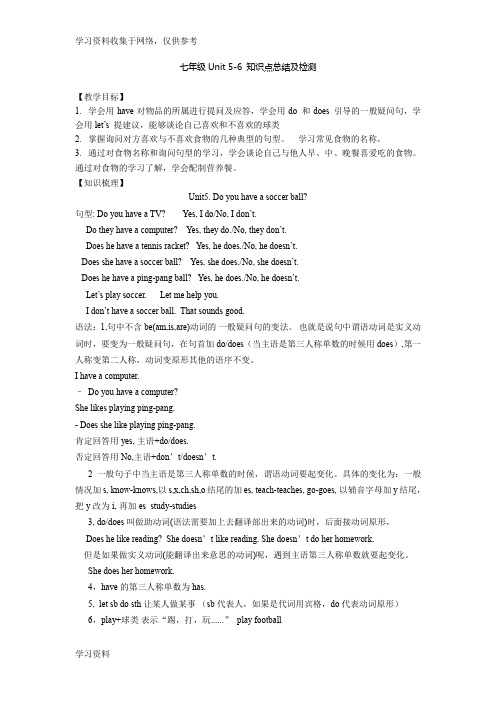
七年级Unit 5-6 知识点总结及检测
【教学目标】
1.学会用have对物品的所属进行提问及应答,学会用do 和does 引导的一般疑问句,学会用let’s 提建议,能够谈论自己喜欢和不喜欢的球类
2.掌握询问对方喜欢与不喜欢食物的几种典型的句型。学习常见食物的名称。
3.通过对食物名称和询问句型的学习,学会谈论自己与他人早、中、晚餐喜爱吃的食物。通过对食物的学习了解,学会配制营养餐。
【知识梳理】
Unit5. Do you have a soccer ball?
句型: Do you have a TV? Yes, I do/No, I don’t.
Do they have a computer? Yes, they do./No, they don’t.
Does he have a tennis racket? Yes, he does./No, he doesn’t.
Does she have a soccer ball? Yes, she does./No, she doesn’t.
Does he have a ping-pang ball? Yes, he does./No, he doesn’t.
Let’s play soccer. Let me help you.
I don’t have a soccer ball. That sounds good.
语法:1,句中不含be(am,is,are)动词的一般疑问句的变法。也就是说句中谓语动词是实义动词时,要变为一般疑问句,在句首加do/does(当主语是第三人称单数的时候用does),第一人称变第二人称,动词变原形其他的语序不变。
最全面人教版七年级上册英语第五单元知识点归纳总结
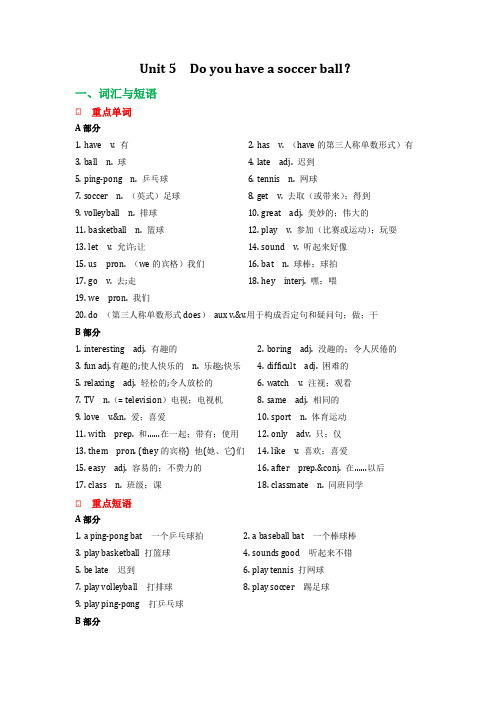
Unit 5 Do you have a soccer ball?
一、词汇与短语
● 重点单词
A部分
1.have v. 有
2.has v. (have的第三人称单数形式)有
3.ball n. 球
te adj. 迟到
5.ping-pong n. 乒乓球
6.tennis n. 网球
7.soccer n. (英式)足球8.get v. 去取(或带来);得到
9.volleyball n. 排球10.great adj. 美妙的;伟大的
11.basketball n. 篮球12.play v. 参加(比赛或运动);玩耍13.let v. 允许;让14.sound v. 听起来好像
pron. (we的宾格)我们16.bat n. 球棒;球拍
17.go v. 去;走18.hey interj. 嘿;喂
19.we pron. 我们
20.do (第三人称单数形式does)aux v.&v.用于构成否定句和疑问句;做;干
B部分
1.interesting adj. 有趣的
2.boring adj. 没趣的;令人厌倦的
3.fun adj.有趣的;使人快乐的n. 乐趣;快乐
4.difficult adj. 困难的
5.relaxing adj. 轻松的;令人放松的
6.watch v. 注视;观看
n.(= television)电视;电视机8.same adj. 相同的
9.love v.&n. 爱;喜爱10.sport n. 体育运动
11.with prep. 和……在一起;带有;使用12.only adv. 只;仅
人教版七年级英语上册unit5-6知识点总结
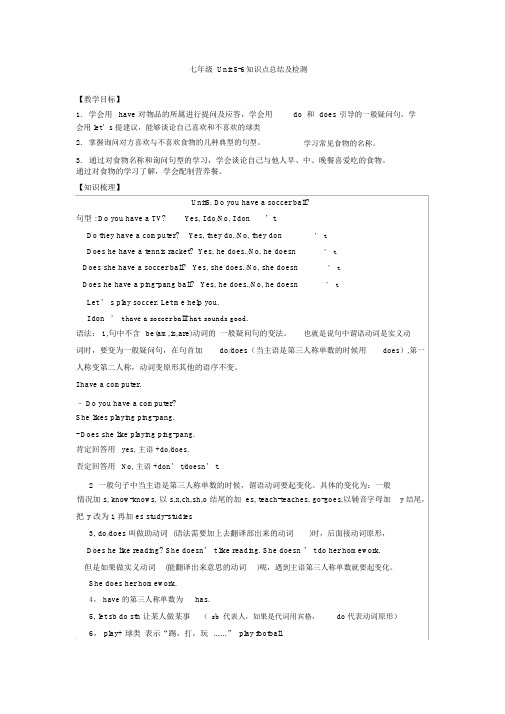
七年级 Unit 5-6知识点总结及检测
【教学目标】
1.学会用have 对物品的所属进行提问及应答,学会用do和does引导的一般疑问句,学
会用 let’s 提建议,能够谈论自己喜欢和不喜欢的球类
2.掌握询问对方喜欢与不喜欢食物的几种典型的句型。学习常见食物的名称。
3.通过对食物名称和询问句型的学习,学会谈论自己与他人早、中、晚餐喜爱吃的食物。
通过对食物的学习了解,学会配制营养餐。
【知识梳理】
Unit5. Do you have a soccer ball?
句型 : Do you have a TV?Yes, I do/No, I don’t.
Do they have a computer? Yes, they do./No, they don’ t.
Does he have a tennis racket? Yes, he does./No, he doesn’ t.
Does she have a soccer ball? Yes, she does./No, she doesn’ t.
Does he have a ping-pang ball? Yes, he does./No, he doesn’ t.
Let ’ s play soccer. Let me help you.
I don’ t have a soccer ballThat. sounds good.
语法: 1,句中不含be(am,is,are)动词的一般疑问句的变法。也就是说句中谓语动词是实义动
词时,要变为一般疑问句,在句首加do/does(当主语是第三人称单数的时候用does),第一人称变第二人称,动词变原形其他的语序不变。
人教版英语七年级上册Unit5知识点总结
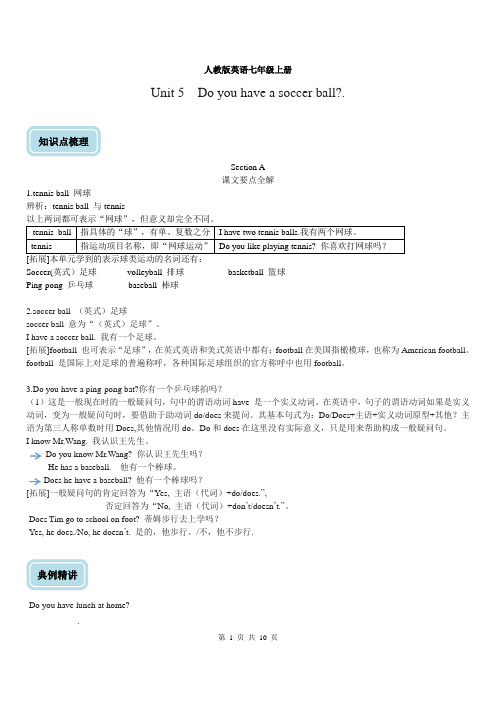
人教版英语七年级上册
Unit 5 Do you have a soccer ball?.
知识点梳理
Section A
课文要点全解
1.tennis ball 网球
辨析:tennis ball 与tennis
以上两词都可表示“网球”,但意义却完全不同。
[拓展]本单元学到的表示球类运动的名词还有:
Soccer(英式)足球volleyball 排球basketball 篮球
Ping-pong 乒乓球baseball 棒球
2.soccer ball (英式)足球
soccer ball 意为“(英式)足球”。
I have a soccer ball. 我有一个足球。
[拓展]football 也可表示“足球”,在英式英语和美式英语中都有;football在美国指橄榄球,也称为American football。football 是国际上对足球的普遍称呼,各种国际足球组织的官方称呼中也用football。
3.Do you have a ping-pong bat?你有一个乒乓球拍吗?
(1)这是一般现在时的一般疑问句,句中的谓语动词have 是一个实义动词。在英语中,句子的谓语动词如果是实义动词,变为一般疑问句时,要借助于助动词do/does来提问。其基本句式为:Do/Does+主语+实义动词原型+其他?主语为第三人称单数时用Does,其他情况用do。Do和does在这里没有实际意义,只是用来帮助构成一般疑问句。
I know Mr.Wang. 我认识王先生。
Do you know Mr.Wang? 你认识王先生吗?
新目标人教版七年级上册英语unit5课件

30.他(她,它)们pron._t_h__e_m_
31.只;仅adv._o_n__ly_ 32.喜欢;喜爱v.__l_ik_e_ 33.容易的;不费力的adj._e_a_s_y__ 34.在...以后prep/conj.a_f_t_e_r__ 35.班级;课n.__c_la_s_s__ 36.同班同学n._c_la_s_s_mate
11.我们(we的宾格) pron.__u_s__ 12.去,走 v.___g_o___ 13.我们 pron.__w__e__ 14.迟到adj.__l_a_t_e_ 15.有(have的单三形式)v.__h_a_s__ 16.去取(带来);得到 v._g__e_t_
17.美妙的;伟大的adj.g__re__a_t 18.参加(比赛、运动);玩耍v._p__l_ay
17.与...玩耍_p_l_a_y_w__it_h_.._. 18.做运动_d_o_/_p_la_y__s_p_o_rts 19.别着急,放轻松_t_a_k_e_i_t_e_a_s_y 20.课后a_f_t_e_r _c_la_s_s_ 21.放学后a_f_t_e_r _s_c_h_ool
检测题
知识点二:短语
1.英式足球_a__s_o_c_c_e_r ball
七年级上册英语第五单元知识点总结
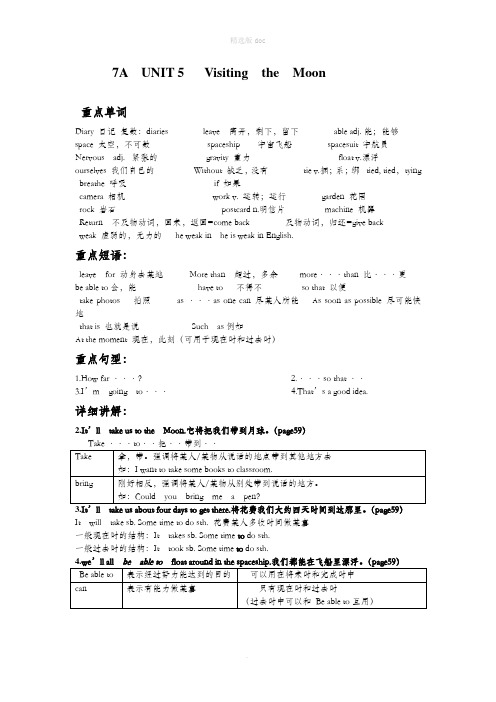
7A UNIT 5Visiting the Moon
重点单词
Diary 日记复数:diaries leave 离开,剩下,留下able adj. 能;能够space 太空,不可数spaceship 宇宙飞船spacesuit 宇航员Nervous adj. 紧张的gravity 重力float v.漂浮ourselves 我们自己的Without 缺乏,没有tie v.捆;系;绑tied, tied, tying breathe 呼吸if 如果
camera 相机work v. 运转;运行garden 花园
rock 岩石postcard n.明信片machine 机器
Return 不及物动词,回来,返回=come back 及物动词,归还=give back
weak 虚弱的,无力的he weak in he is weak in English.
重点短语:
leave for 动身去某地More than 超过,多余more···than 比···更
be able to会,能have to 不得不so that 以便
take photos 拍照as ···as on e can 尽某人所能As soon as possible 尽可能快地
that is 也就是说Such as例如
At the moment 现在,此刻(可用于现在时和过去时)
重点句型:
1.How far ···?
2.···so that ··
3.I’m going to···
4.That’s a good idea.
详细讲解:
七年级上英语unit5知识点归纳

七年级上英语unit5知识点归纳本文将对七年级上英语Unit5的知识点进行归纳,希望能帮助同学们更好地掌握这一单元的内容。
一、询问和回答方位
当我们想询问某个地点的位置时,可以用以下句式:
Where is the...?(...在哪里?)
例如:
Where is the library?(图书馆在哪里?)
When you go straight, you will see it on your right.(一直直走,你会在右边看到它。)
回答时可以使用以下的表达方式:
It is(在)+ 位置名称 +(的)+ 方向。
例如:
Where is the supermarket?
It is on the left of the school. (超市在学校左边。)二、介绍人物
当我们想介绍一个人时,可以从以下方面进行介绍:1.姓名
What’s his/her name?(他/她叫什么名字?)
His/Her name is…
2.国籍
Where is he/she from?(他/她来自哪个国家?)He/She is from…
3.年龄
How old is he/she?(他/她多大了?)
He/She is … years old.
4.兴趣爱好
What does he/she like?(他/她喜欢什么?)
He/She likes…
5.外貌特征
What does he/she look like?(他/她长什么样子?)
He/She is tall/short, has (blonde/brown/black) hair and
七年级上册英语第五单元知识点总结:Unit 5
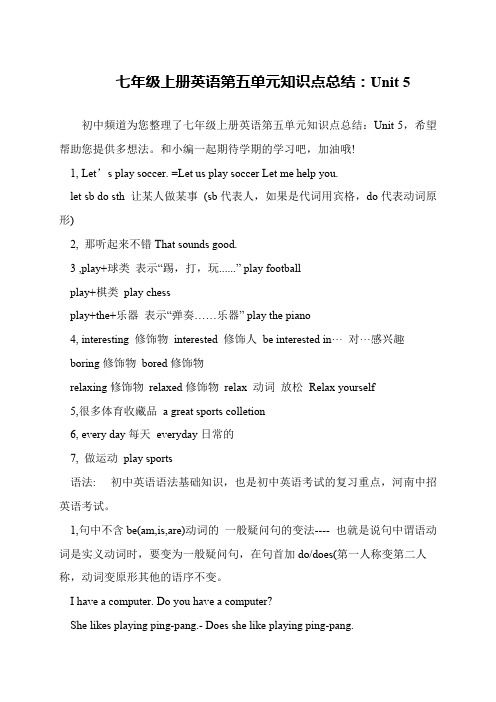
七年级上册英语第五单元知识点总结:Unit 5
初中频道为您整理了七年级上册英语第五单元知识点总结:Unit 5,希望帮助您提供多想法。和小编一起期待学期的学习吧,加油哦!
1, Let’s play soccer. =Let us play soccer Let me help you.
let sb do sth 让某人做某事(sb代表人,如果是代词用宾格,do代表动词原形)
2, 那听起来不错That sounds good.
3 ,play+球类表示“踢,打,玩......” play football
play+棋类play chess
play+the+乐器表示“弹奏……乐器” play the piano
4, interesting 修饰物interested 修饰人be interested in··· 对···感兴趣
boring修饰物bored修饰物
relaxing修饰物relaxed修饰物relax 动词放松Relax yourself
5,很多体育收藏品a great sports colletion
6, every day每天everyday日常的
7, 做运动play sports
语法: 初中英语语法基础知识,也是初中英语考试的复习重点,河南中招英语考试。
1,句中不含be(am,is,are)动词的一般疑问句的变法---- 也就是说句中谓语动词是实义动词时,要变为一般疑问句,在句首加do/does(第一人称变第二人称,动词变原形其他的语序不变。
I have a computer. Do you have a computer?
人教版七年级上册英语 Unit 1 - Unit 5 知识点总结

人教版七年级上册英语Unit 1 - Unit 5 知识点总结Unit 1 My name ’s Gina知识点总结
一、重点短语、句型
1. -What ’s your name?
- My name's Gina. = I ’m Gina.
你的名字是什么?
我的名字是吉娜。我是吉娜。
2.-What ’s his/her name?
- His /Her name ’s Tom/ Gina.
=He’s /She’s Tom/ Gina.
他/她的名字是什么?
他/她的名字是汤姆/吉娜。
他/她叫汤姆/吉娜。
3.- Is she Mary? –Yes, she is./ No, she isn ’t.
她是玛丽吗?是的,她是。不,她不是。
4.-Are you Helen? –Yes, I am 。/ No, I ’m not.
你是海伦吗?是的,我是。不,我不是。
5. A: What's your telephone number?
B: My phone number is 281-9176.
It's 281-9176.
你的电话号码是多少?
我的电话号码是281-9176 。
6. -Nice to meet/see you. -Nice to meet/see you, too. 见到你很高兴。见到你也很高兴 .
st name=family name=last name 姓氏
8.first name = given name 名字
9.telephone number=phone number 电话号码
二、交际用语
七年级英语上册五单元
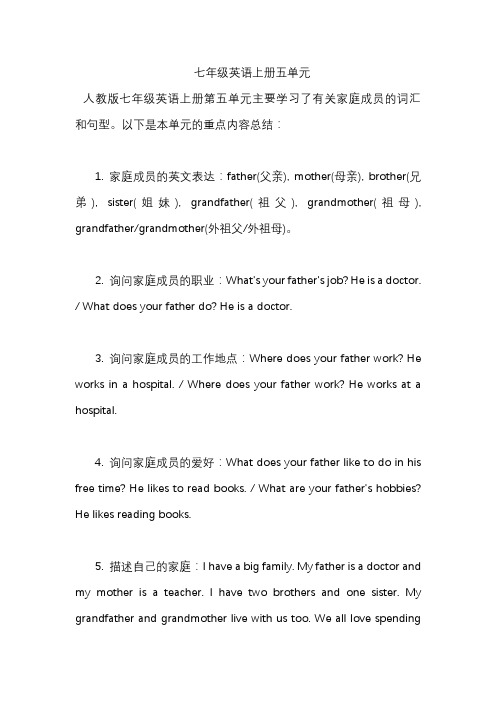
七年级英语上册五单元
人教版七年级英语上册第五单元主要学习了有关家庭成员的词汇和句型。以下是本单元的重点内容总结:
1. 家庭成员的英文表达:father(父亲), mother(母亲), brother(兄弟), sister(姐妹), grandfather(祖父), grandmother(祖母), grandfather/grandmother(外祖父/外祖母)。
2. 询问家庭成员的职业:What's your father's job? He is a doctor. / What does your father do? He is a doctor.
3. 询问家庭成员的工作地点:Where does your father work? He works in a hospital. / Where does your father work? He works at a hospital.
4. 询问家庭成员的爱好:What does your father like to do in his free time? He likes to read books. / What are your father's hobbies? He likes reading books.
5. 描述自己的家庭:I have a big family. My father is a doctor and my mother is a teacher. I have two brothers and one sister. My grandfather and grandmother live with us too. We all love spending
最新人教版-七年级上册-英语知识点-全----第五单元unit-5-知识点
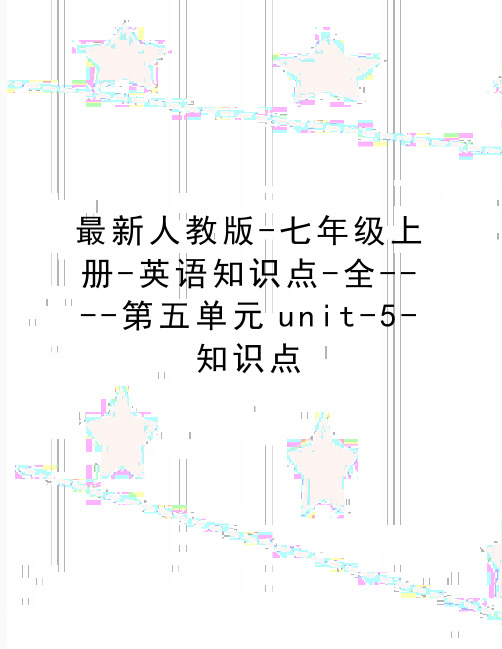
最新人教版-七年级上册-英语知识点-全----第五单元u n i t-5-
知识点
Unit 5谈论物品所属关系。
1、重点词汇:do、have、tennis、ping-pong bat、soccer、volleyball、basketball、play、interesting、boring、fun、difficult、relaxing、watch、same...
2、soccer ball(英式)足球 a tennis bat一个网球拍baseball bat 棒球拍
be late 迟到 watch TV 看电视 on TV 在电视上
play basketball 打篮球 play sports 做运动或参加体育比赛
3、含有实意动词的一般疑问句的结构及答语。
---Do you /they have a...? e.g. Do they have a basketball?
---Yes,I/they do./No,I/the y don’t.
---Does he /she have a...? e.g. Does she have a new schoolbag?
---Yes,he/she does./No,he/she doesn’t.
( )----Do you have lunch at home?
----___________.
A. Yes, I am
B. Yes, I can
C. Yes, I do
D. Yes, I have
4、tennis 和tennis ball的区别:tennis指运动项目名称,即“网球运动”。tennis ball 则指具体的球,有单、复数之分。e.g. a tennis ball/some tennis balls
人教版七上英语Unit5单元总复习课件-PPT
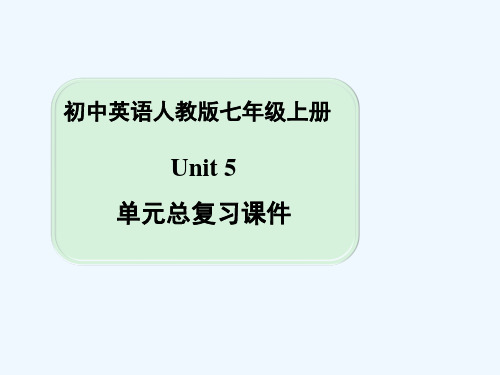
[常见用法] play作不及物动词时,意为“玩耍” ,可以用play with来表达。 play作及物动词时,后面可以接表示球类的词,意为“玩/打(球)”。play后 面也可以接表示乐器类的词,意为“演奏,表演”,但前面要先加定冠词 the。
Do you play tennis?你打网球吗?
She plays the piano every day.她每天都弹钢琴。
with /wið/ prep. 和......在一起;带有;使用
表示和......在一起 parents.
---many people live with their
表示“带有,具有”
---tom drows picture with a pencil.
① 表示用某种工具或手段
---the girl with golden hair.
初中英语人教版七年级上册
Unit 5 单元总复习课件
Unit 5
Do you have a soccer ball?
1 词汇+句型训练营
2 语法加油站
3
短文读读背
词汇+句子训练营
1
vocabulary
tennis /'tenis/ n. 网球 ball /bɔ:l/ n. 球 ping-pong /'piŋpɔŋ/ n. 乒乓球 bat /bæ t/ n. 球棒;球拍 soccer /'sɔkə/ n. 足球 soccer ball 足球 volleyball /'vɔlibɔ:l/ n. 排球 basketball /'ba:skitbɔ:l/ n. 篮球 sport /spɔ:t/ n. 体育运动 class /kla:s/ n. 班级;课 classmate /'kla:smeit/ n. 同班同学
人教版七年级英语上册unit 5--6期末基础知识点复习及训练(含答案)
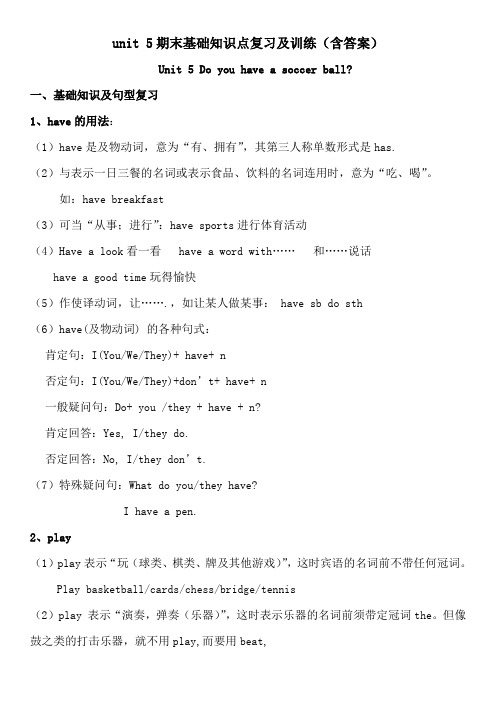
unit 5期末基础知识点复习及训练(含答案)
Unit 5 Do you have a soccer ball?
一、基础知识及句型复习
1、have的用法:
(1)have是及物动词,意为“有、拥有”,其第三人称单数形式是has.
(2)与表示一日三餐的名词或表示食品、饮料的名词连用时,意为“吃、喝”。
如:have breakfast
(3)可当“从事;进行”:have sports进行体育活动
(4)Have a look看一看 have a word with……和……说话
have a good time玩得愉快
(5)作使译动词,让…….,如让某人做某事: have sb do sth
(6)have(及物动词) 的各种句式:
肯定句:I(You/We/They)+ have+ n
否定句:I(You/We/They)+don’t+ have+ n
一般疑问句:Do+ you /they + have + n?
肯定回答:Yes, I/they do.
否定回答:No, I/they don’t.
(7)特殊疑问句:What do you/they have?
I have a pen.
2、play
(1)play表示“玩(球类、棋类、牌及其他游戏)”,这时宾语的名词前不带任何冠词。
Play basketball/cards/chess/bridge/tennis
(2)play 表示“演奏,弹奏(乐器)”,这时表示乐器的名词前须带定冠词the。但像鼓之类的打击乐器,就不用play,而要用beat,
例:play the piano/violin/guitar
七年级英语上册Unit5-6重点、考点知识总结
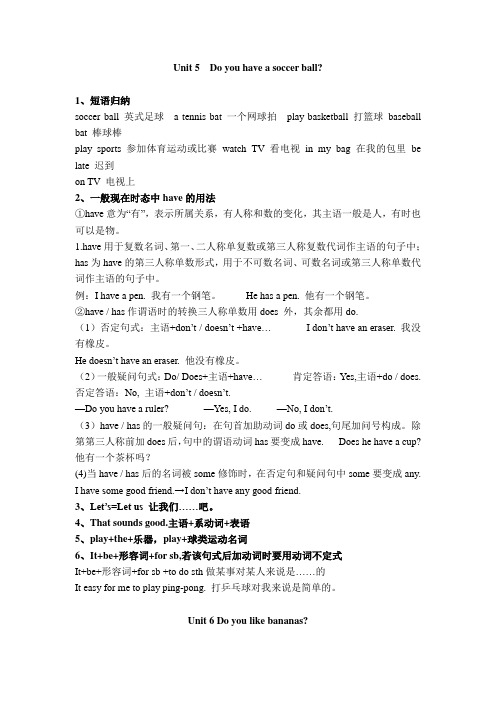
Unit 5 Do you have a soccer ball?
1、短语归纳
soccer ball 英式足球 a tennis bat 一个网球拍play basketball 打篮球baseball bat 棒球棒
play sports 参加体育运动或比赛watch TV 看电视in my bag 在我的包里be late 迟到
on TV 电视上
2、一般现在时态中have的用法
①have意为“有”,表示所属关系,有人称和数的变化,其主语一般是人,有时也可以是物。
1.have用于复数名词、第一、二人称单复数或第三人称复数代词作主语的句子中;has为have的第三人称单数形式,用于不可数名词、可数名词或第三人称单数代词作主语的句子中。
例:I have a pen. 我有一个钢笔。He has a pen. 他有一个钢笔。
②have / has作谓语时的转换三人称单数用does 外,其余都用do.
(1)否定句式:主语+don’t / doesn’t +have… I don’t have an eraser. 我没有橡皮。
He doesn’t have an eraser. 他没有橡皮。
(2)一般疑问句式:Do/ Does+主语+have… 肯定答语:Yes,主语+do / does. 否定答语:No, 主语+don’t / doesn’t.
—Do you have a ruler? —Yes, I do. —No, I don’t.
(3)have / has的一般疑问句:在句首加助动词do或does,句尾加问号构成。除第第三人称前加does后,句中的谓语动词has要变成have. Does he have a cup? 他有一个茶杯吗?
人教版-七年级上册Unit5单元知识点详细梳理与讲解(含答案)
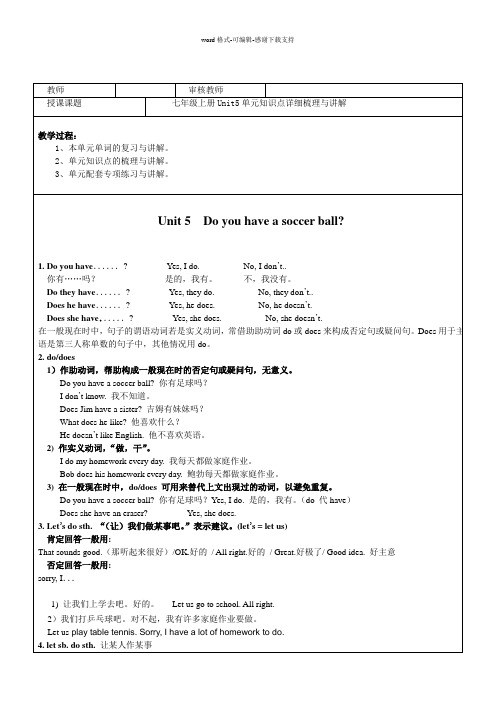
word格式-可编辑-感谢下载支持
A.every-day
B.everyday
C.every day
D.more
2.—Does he play sports?
—No, .He only watches them TV.[来源:Z+xx+]
A.he does;on
B.he does;in
C.he doesn’t;on
D.he doesn’t;in
3.That’s an question.
A.interesting
B.boring
C.difficult
D.relaxing
4.Mr Wang a watch.
A.doesn’t has
B.doesn’t have
C.don’t have
D.don’t has
5.Do you TV every day?
A.look
B.see
C.watch
D.read
6.I don’t have a tennis, I have a baseball.
A.and
B.but
C.or
D.too
7.Let’s it. H-A-L-L,hall.
A.spells
B.spelling
C.to spell
D.spell
8.Jim have a ball.
A.doesn’t
B.don’t
C.isn’t
D.aren’t
9.—Can you draw pictures?
—No,I can’t.It is very .
A.good
B.nice
C.difficult
D.fun
10. you have a new computer?
A.Is
B.Are
C.Do
D.Does
二、完形填空
I have 1 uncle. He likes sports very 2 . He 3 soccer, baseball, volleyball, basketball,
七年级上册英语正式篇第五单元知识点
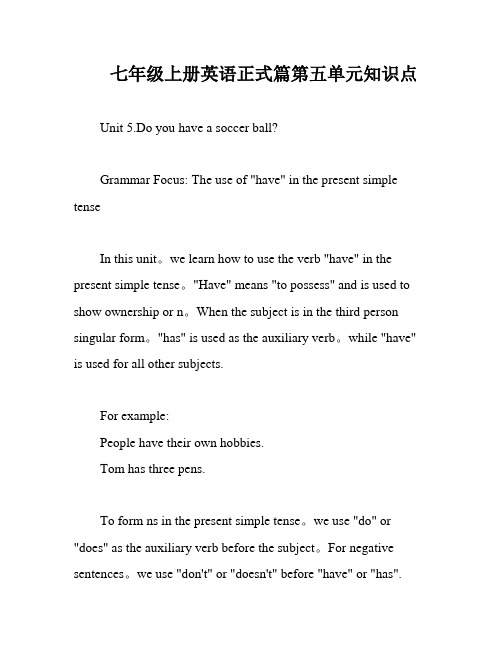
七年级上册英语正式篇第五单元知识点
Unit 5.Do you have a soccer ball?
Grammar Focus: The use of "have" in the present simple tense
In this unit。we learn how to use the verb "have" in the present simple tense。"Have" means "to possess" and is used to show ownership or n。When the subject is in the third person singular form。"has" is used as the auxiliary verb。while "have" is used for all other subjects.
For example:
People have their own hobbies.
Tom has three pens.
To form ns in the present simple tense。we use "do" or "does" as the auxiliary verb before the subject。For negative sentences。we use "don't" or "doesn't" before "have" or "has".
For example:
Do you have a bike?
Does he have a soccer ball?
- 1、下载文档前请自行甄别文档内容的完整性,平台不提供额外的编辑、内容补充、找答案等附加服务。
- 2、"仅部分预览"的文档,不可在线预览部分如存在完整性等问题,可反馈申请退款(可完整预览的文档不适用该条件!)。
- 3、如文档侵犯您的权益,请联系客服反馈,我们会尽快为您处理(人工客服工作时间:9:00-18:30)。
Unit 5谈论物品所属关系。
1、重点词汇:do、have、tennis、ping-pong bat、soccer、volleyball、basketball、play、interesting、
boring、fun、difficult、relaxing、watch、same...
2、soccer ball(英式)足球 a tennis bat一个网球拍baseball bat 棒球拍
be late 迟到watch TV 看电视on TV 在电视上
play basketball 打篮球play sports 做运动或参加体育比赛
3、含有实意动词的一般疑问句的结构及答语。
---Do you /they have a...? e.g. Do they have a basketball?
---Yes,I/they do./No,I/they don’t.
---Does he /she have a...? e.g. Does she have a new schoolbag?
---Yes,he/she does./No,he/she doesn’t.
( )----Do you have lunch at home?
----___________.
A. Yes, I am
B. Yes, I can
C. Yes, I do
D. Yes, I have
4、tennis 和tennis ball的区别:tennis指运动项目名称,即“网球运动”。tennis ball 则指具
体的球,有单、复数之分。e.g. a tennis ball/some tennis balls
5、一般现在时中have的用法以及与there be 句型的辨析;
have “有”即某物属于某人,表示所属关系,三单形式为has.
e.g. I have a blue jacket and my sister has a yellow one.
there be “有”主要指的是某地存在某物。
e.g. There are many trees in my school.
6、Play + 球类名称;
e.g. play basketball/soccer ball 打篮球/踢足球
Play + the + 西洋乐器类;(中间必须加定冠词the)
e.g. play the piano/violin 弹钢琴/拉小提琴
()The young man plays ______violin very well, but he plays ________ basketball badly.
A.the;the B. a;a C. a;the D. the;/
7、---L et’s..(用于提出建议或征求别人的意见). let’s = let us
--- OK./All right . /That sounds good/great. /Yes,Let’s... /Sorry,I...
】Let “让……”,使役动词,后加动词原形
e.g. Let’s play./ Let’s ask./Let’s play computer games.
8、That sounds good.(sound的用法)
sound 系动词,“听上去,听起来”,为感官动词,其后跟形容词作表语,它有人称和数的变化,在一般现在时的句子中,其疑问句和否定句要借助于do/does 来完成。
e.g. It/that sounds good / It doesn’t sound too bad.
Does it sound good ?
9、get v.“去取或带来,得到)”
e.g. He gets a lot of letters from his new friends.(收到、得到)
I came here this morning to get the newspaper.(去取、拿)
Go and get me some apples.
10、to o adv.“也”通常用于肯定句中,且常置于句末,其前有逗号,但有时也可以插入句中。
e.g. Perhaps there will be a new hospital here, too. 也许这儿也会建一家新医院。I
In peace, too, the Red Cross is expected to send help wherever there is human
suffering. 在和平时期红十字会还被期待着在人们有难的地方提供援助。
--- Nice to talk to you.和你谈话很高兴。
--- Nice to talk to you, too.
11、重要形容词的用法:interesting、boring、fun、different、easy、relaxing..
作用有两点:1)放在连系动词后作表语,说明主语的性质;
e.g. The story is very interesting.
2) 放在名词前做定语,修饰名词。
e.g. It is a interesting story.
12、watch“看、观看”,动词,多用于观看电视、足球赛、日出等。
e.g. I often watch TV./I only watch basketball games on TV.
】watch 、see和look的区别:
1)watch 指非常仔细的“看”表示“注视、观看” e.g. watch TV
2)see “看”着重指看的结果,也可用于“看医生”、“看电影”等短语中。e.g. see a film
3)look “看”强调有意识的动作,多用于唤起别人的注意。加宾语时,要加介词at , e.g.
look at the picture
13、人称代词主格与宾格的用法:谓语动词前用主格,作主语;谓语动词后用宾格,作宾语。试着按要求完成下列表格:
